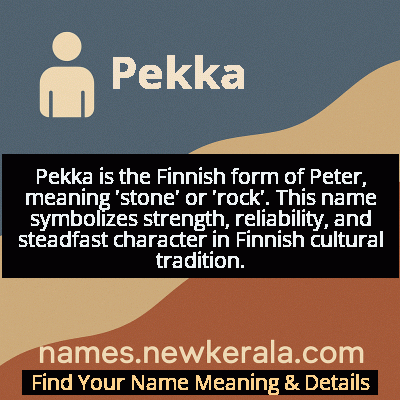Pekka Name Meaning & Details
Origin, Popularity, Numerology Analysis & Name Meaning of Pekka
Discover the origin, meaning, and cultural significance of the name PEKKA. Delve into its historical roots and explore the lasting impact it has had on communities and traditions.
Name
Pekka
Gender
Male
Origin
Finnish
Lucky Number
8
Meaning of the Name - Pekka
Pekka is the Finnish form of Peter, meaning 'stone' or 'rock'. This name symbolizes strength, reliability, and steadfast character in Finnish cultural tradition.
Pekka - Complete Numerology Analysis
Your Numerology Number
Based on Pythagorean Numerology System
Ruling Planet
Saturn
Positive Nature
Ambitious, efficient, realistic, and authoritative.
Negative Traits
Materialistic, stressed, confrontational, and can be overly ambitious.
Lucky Colours
Dark blue, black.
Lucky Days
Saturday.
Lucky Stones
Blue sapphire, amethyst.
Harmony Numbers
2, 4, 6.
Best Suited Professions
Business leaders, managers, financial services, law enforcement.
What People Like About You
Leadership, determination, organizational skills.
Famous People Named Pekka
Pekka Halonen
Painter
National romantic painter celebrated for Finnish nature depictions
Pekka Himanen
Philosopher
Internationally recognized author on information society and ethics
Pekka Rinne
Ice Hockey Player
NHL All-Star and Vezina Trophy winning goaltender
Pekka Haavisto
Politician
Finnish Minister for Foreign Affairs and environmental advocate
Name Variations & International Equivalents
Click on blue names to explore their detailed meanings. Gray names with will be available soon.
Cultural & Historical Significance
The name's enduring popularity reflects its deep roots in Finnish consciousness, where it has maintained relevance across different historical periods. From medieval times when Christian names gained prominence, through the national romantic era when Finnishness was consciously cultivated, to modern times where it represents traditional values, Pekka has consistently been a name that parents choose to express cultural continuity. Its presence in everyday Finnish life - from common expressions to popular media - demonstrates how thoroughly integrated it is in the national psyche, serving as a living link to Finnish heritage and identity.
Extended Personality Analysis
Men named Pekka are commonly associated with a constellation of personality traits that reflect the name's meaning and cultural context. They typically exhibit remarkable stability and reliability, embodying the 'rock-like' quality suggested by their name's meaning. This manifests as emotional steadiness, practical problem-solving abilities, and a methodical approach to life's challenges. Pekkas are often perceived as deeply loyal individuals who value long-term relationships and family connections, demonstrating commitment through consistent actions rather than grand gestures. Their communication style tends to be direct and honest, preferring substance over style and valuing authenticity in all interactions.
Beyond their apparent reserve, Pekkas often possess strong inner determination and quiet confidence. They approach tasks with thoroughness and persistence, rarely seeking attention but consistently delivering results. This combination of practicality and perseverance makes them excellent in roles requiring long-term planning and execution. While they respect tradition and established methods, many Pekkas also demonstrate surprising adaptability when circumstances require change. Their strength lies in balancing respect for the past with pragmatic solutions for the present, creating a personality profile that blends Finnish sisu (perseverance) with practical wisdom. This makes them valued members of their communities - not as flashy leaders, but as reliable pillars who provide stability and guidance through life's uncertainties.
Modern Usage & Popularity
In contemporary Finland, Pekka maintains its status as a classic traditional name, though its popularity patterns have shifted significantly over recent generations. While it dominated name charts in the mid-20th century, frequently ranking among the top names for Finnish boys, its usage has moderated in the 21st century as parents have embraced more international and modern naming options. Currently, Pekka typically ranks outside the top 50 boys' names in Finland, representing a choice that consciously connects to Finnish heritage rather than following current trends. The name enjoys particular strength in rural areas and among families with strong regional roots, where traditional names maintain greater cultural resonance. Interestingly, there's evidence of a mild resurgence among urban, educated parents who appreciate the name's authenticity and cultural depth, seeing it as a distinctive alternative to more common international names. The name also continues to be popular within Finnish expatriate communities worldwide, where it serves as a meaningful link to cultural identity.
Symbolic & Spiritual Meanings
The symbolic resonance of Pekka extends far beyond its literal meaning of 'stone' to encompass profound metaphorical significance. It represents the foundational strength that supports structures and communities - the unseen but essential bedrock upon which everything else depends. This symbolism translates to human qualities of reliability, steadfastness, and the ability to provide emotional and practical support to others. The name evokes the image of ancient granite bedrock that characterizes Finland's landscape, connecting the individual to national identity and the enduring power of nature. Symbolically, Pekka suggests a person who weathers life's storms without losing their essential character, much like stone withstands centuries of elemental forces while maintaining its integrity.
Metaphorically, the name also carries associations with building and construction - both literal structures and the architecture of relationships and communities. It implies someone who contributes to lasting foundations rather than temporary arrangements, valuing quality and durability over quick results. In Finnish cultural context, the symbolism extends to include the ideal of 'sisu' - that particularly Finnish concept of stoic determination, courage, and resilience in facing adversity. The stone symbolism thus becomes a powerful metaphor for the Finnish national character itself: seemingly unassuming but possessing incredible inner strength, able to endure hardship through quiet perseverance rather than dramatic heroism.

